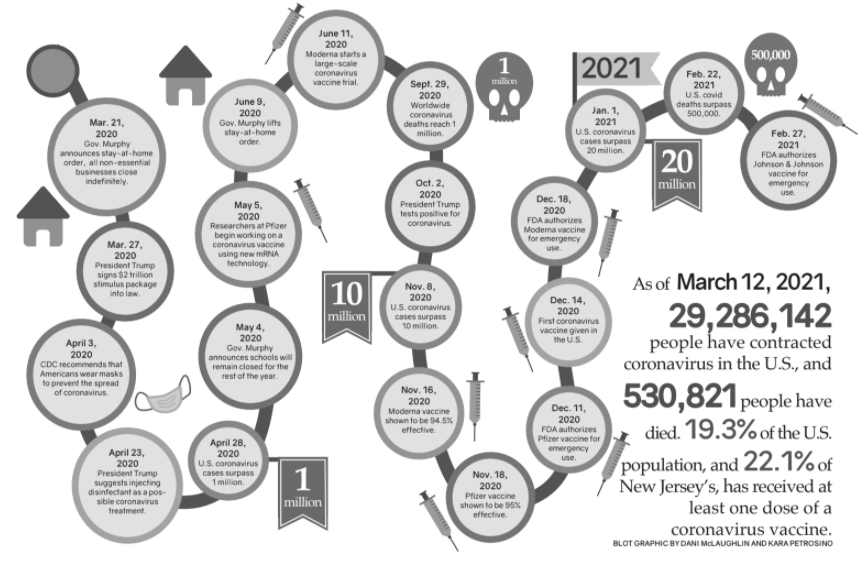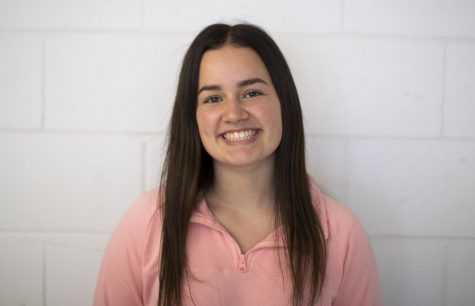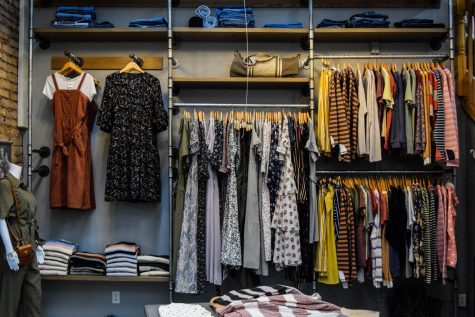One year later: reflecting on life during COVID-19
BLOT GRAPHIC BY DANI McLAUGHLIN AND KARA PETROSINO
As of March 12, 2021, 29,286,142 people have contracted coronavirus in the U.S., and 530,821 people have died. 19.3% of the U.S. population, and 22.1% of New Jersey’s, has received at least one dose of a coronavirus vaccine.
March 12, 2021
March 13, 2020, was the day all of our lives changed — though none of us realized it at the time. We were told that due to concerns over the spread of the novel coronavirus, school would be conducted virtually for the next two weeks. What we didn’t know was that a year later, virtual school would still be the new normal, and the pandemic overall would become devastating beyond imagination.
After the initial two-week announcement, it’s safe to say that we were excited. Shorter days, sleeping in and getting to stay in pajamas all day — what more could teenagers want? But as those two weeks progressed, it was evident that this was more serious than anyone had anticipated.
Soon, those two weeks turned into a month, and even after Spring Break, there was hope that we’d be back in-person before the end of the year. But again, that wasn’t the case.
At this point, the so-called “new normal” of the pandemic had been developed, consisting of masks, social distancing and quarantining, all of which is now a significant part of daily life.
And again, things started looking up over the summer as cases began to decline. There wasn’t a doubt in our minds that we’d be back in school by the fall. Yet, things took a turn for the worst once more, with the second wave of the pandemic resulting in record-high cases and deaths almost daily.
Due to staffing issues, MCVSD decided to postpone in-person learning for a month, until a hybrid schedule was able to be successfully implemented.
Even as cases spiked, everyone held onto the hope that 2021 would be a fresh start. As we said goodbye and good riddance to 2020, we’d hoped to be able to do the same to the pandemic. But, two and a half months in, we’re still here.
In light of everything, our world today isn’t much different from a year ago — only now we know the severity of the situation.
Restrictions are still in place regarding masks and gatherings, we’re still learning from home, granted it’s three days a week compared to five, and we’re still losing lives to the virus every day.
We, as students, have been among those hit the hardest, not physically, but emotionally. The classes of 2020 and 2021 have faced event cancellations, a harder college decision process and essentially the loss of their highly-anticipated senior year of high school. Our administration and parents are doing everything they can to make it special, but nothing will compare to the “best year of our lives,” as we were promised up until a year ago. The lack of human contact, especially, has been a discouragement to motivation and only worsened the other yearly pandemic among high school students, Senioritis.
Fortunately, with safe and effective vaccines and numbers currently on the decline, there is a light at the end of the tunnel. For the first time in this pandemic, after all of its unknowns and uncertainties, the beginning of the end is in sight.
Throughout this troubling year, we’ve had to adapt and make the best of the situation given to us, and through it, we’ve become more creative and resilient, learning how to improvise a continuation of normalcy. We’ve turned to technology to help us connect with others when we physically could not. We’ve appreciated spending more time with our families and growing closer to each other. We’ve learned to appreciate what we have and to never take things for granted because we saw just how easily things can be lost. And if there has been any benefit to staying at home all the time, it has directly caused pollution levels to drop 20%, according to NASA.
Looking back one year later since the start of the pandemic, it’s clear that a lot has changed and that some things may never go back to being the way they were before. It will take years to recover from the economic downfall, and we could never replace the loved ones that have been lost. Yet most importantly, we learned something about ourselves and the way we see the world because of this pandemic, and once it is all over, hopefully, we can take those lessons with us as we move on and close this chapter of the history books.









